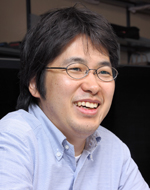2010/09/03
Envisioning the day robots and humans wash a cup together
Associate Professor Kei Okada
(Department of Mechano-Informatics)

Associate Professor Okada aims at developing robots that wash a cup with humans, carry on incomplete cleaning tasks by humans, and fold a shirt cleaned in a washing machine if no one is around. In other words, it is a research for the future society where humans and robots can truly coexist.
If humans drop a cup, they would involuntarily pick it up and continue to wash it. This research intends to enable robots to pick up and wash a cup just like humans by using knowledge acquired through observation of human behavior. Today, robots retry to grab a cup if they fail to grab it and drop it while washing. CCD cameras monitor the surrounding environment and carefully check the motion of the hand, quipped with sensors, that tries to grab the cup. Thus, robots recollect failed processes and retry to grab and wash the cup. Robots can currently determine why it failed and repeat the same motion until it succeeds. However, the problem is the next step. “The way to recover and correct failed motion” is not established yet and it needs to be learned and taught from human behavior.
Special focus is given to robots’ ability to handle soft materials such as a piece of cloth. It is hard to tell the original shape if a cloth is pinched and picked up. Robots are expected to master a series of motions including picking up a towel on the floor and putting it in a washing machine, pressing a button to start washing, taking it out of a washing machine and stretching and folding it.
Associate Professor Okada’s approach is to study each task such as visual and hand functions first and apply them to specific tasks, for example dishwashing . Then, new challenges that arose from this particular application are addressed and applied to the next task, for example to fold clothes. Once basic functions are identified, they are refined to be leveraged to the next level of application as core technology. In addition, common software is used across different functions. This is how today’s robots have evolved to have improved intelligence to make judgments about motions and situations such as “it may have failed” or “something is wrong” without being taught by humans. Associate Professor Okada is a robot researcher who looks to practical applications.